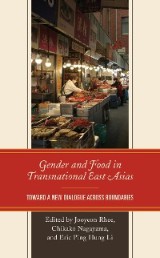Details

Gender and Food in Transnational East Asias
Toward a New Dialogue across Boundaries|
44,99 € |
|
| Verlag: | Lexington Books |
| Format: | EPUB |
| Veröffentl.: | 12.10.2021 |
| ISBN/EAN: | 9781793623553 |
| Sprache: | englisch |
| Anzahl Seiten: | 310 |
DRM-geschütztes eBook, Sie benötigen z.B. Adobe Digital Editions und eine Adobe ID zum Lesen.
Beschreibungen
<p><span>Gender and Food in Transnational East Asias</span><span> illustrates how the production and consumption of food encapsulates the changes that affect social positions of women and men and their relationships with their families, the state, and their work, as well as shapes their gender, sexual, ethnic, and national identities. The transnational movement of food and people between East Asia and the rest of the world is increasingly visible, forming various forces behind the cultural and political constructions of gender politics among and beyond Asian diasporas. By critically engaging with history, practices, and representation of food as a constructive window to articulate gender dynamics in the East Asian region, this volume approaches food as a symbolic and material site where gender roles and identities are imagined, performed, and negotiated. It argues that a critical engagement with practices and representations of food from gender perspectives can enhance our understanding of the society and culture of transnational East Asias.</span></p>
<p></p>
<p></p>
<p><span>Gender and Food in Transnational East Asias</span><span> places the relationship between food and gender in cross-cultural, cross-regional, and transnational contexts in order to identify how global politics, economy, and culture influence gender dynamics; and maintain or shift the existing gender hierarchy, inequality, and sexual behavior.</span></p>
<p></p>
<p></p>
<p><span>Table of Contents</span></p>
<p></p>
<p><span>Acknowledgments</span></p>
<p><span>Introduction </span></p>
<p><span>Jooyeon Rhee, Chikako Nagayama, and Eric Ping Hung Li</span></p>
<p></p>
<p><a><span>Part I: Imagination of Culinary Nationalism</span></a></p>
<p></p>
<p><span>Chapter 1</span><a><span> Women, Waste, and War: Food, Gender, and Rationalization in Wartime Japanese Discourse</span></a></p>
<p><span>Nathan Hopson</span></p>
<p></p>
<p><span>Chapter 2</span><span>A Bite of the Gender Equality Discourse in China: Observations from Food</span></p>
<p><span>Guojun (Sawyer) He, Dandan Fang, and Jonathan Deschênes </span></p>
<p></p>
<p><span>Chapter 3</span><span> Young Men in Chef Uniforms and Suffering Mothers in </span><span>Hanbok</span><span>: Gendered Representation of National Cuisine in the </span><span>Sikkaek</span><span> Series</span></p>
<p><span>Maria Osetrova </span></p>
<p></p>
<p><a><span>Part II: Body and Embodiment</span></a></p>
<p></p>
<p><span>Chapter 4</span><span> The Body as Food: Gender, Eating, and Cannibalism in Yan Lianke’s </span><span>The Four Books</span></p>
<p><span>Shelley W. Chan </span></p>
<p></p>
<p><span>Chapter 5</span><span>“Veganism Will Rise like Feminism”: The Porous Contestation of Intersectional Vegan Feminism against the Exclusive Politics of Korean Popular Feminism</span></p>
<p><span>Su Young Choi </span></p>
<p></p>
<p><span>Chapter 6</span><span>Embodying Carnal Appetites: Food and Sexuality in Li Ang’s </span><span>Mandarin Duck Aphrodisiacs</span></p>
<p><span>Chien-wei Pan </span></p>
<p></p>
<p></p>
<p><a><span>Part III: Performance of Masculinity and Femininity</span></a></p>
<p></p>
<p><span>Chapter 7</span><span>Gender Politics in Food Escape: Korean Masculinity in TV Cooking Shows in South Korea</span></p>
<p><span>Jooyeon Rhee </span></p>
<p></p>
<p><span>Chapter 8</span><span>Neoliberal Women’s Agency and Time-Space Management in the Cook-and-Save Method, </span><span>Tsukurioki</span></p>
<p><span>Chikako Nagayama</span></p>
<p></p>
<p><span>Chapter 9</span><span> Eating as a Way of Performing Gender: The Intersection of Food, Gender, and Human Capital in Taiwan </span></p>
<p><span>Amélie Keyser-Verreault</span></p>
<p></p>
<p><span>Chapter 10</span><span> (Post-)traumatic Logic of Socialism, Hunger, and Masculinity in Zhang Xianliang’s </span><span>Mimosa</span><span> (1984)</span></p>
<p><span>Gabriel F. Y. Tsang </span></p>
<p></p>
<p><a><span>Part IV: Transnational Practice of Food and Gender</span></a></p>
<p></p>
<p><span>Chapter 11</span><span>Fashioning K-Food: New Gendered Space and Culture in South Korea</span></p>
<p><span>Eric Ping Hung Li, Somin Lee, and Matt Husain </span></p>
<p></p>
<p><span>Chapter 12</span><span>Grace Chu: Chinese Cooking at the Crossroad of Ethnicization and Emplacement</span></p>
<p><span>Violetta Ravagnoli</span></p>
<p></p>
<p><span>Chapter 13</span><span> Social Change and Gendered Gift-Giving Rituals: A Historical Analysis of Valentine’s Day in Japan</span></p>
<p><span>Yuko Minowa, Olga Khomenko, and Russell W. Belk</span></p>
<p></p>
<p></p>
<p><span>Acknowledgments</span></p>
<p><span>Introduction </span></p>
<p><span>Jooyeon Rhee, Chikako Nagayama, and Eric Ping Hung Li</span></p>
<p></p>
<p><a><span>Part I: Imagination of Culinary Nationalism</span></a></p>
<p></p>
<p><span>Chapter 1</span><a><span> Women, Waste, and War: Food, Gender, and Rationalization in Wartime Japanese Discourse</span></a></p>
<p><span>Nathan Hopson</span></p>
<p></p>
<p><span>Chapter 2</span><span>A Bite of the Gender Equality Discourse in China: Observations from Food</span></p>
<p><span>Guojun (Sawyer) He, Dandan Fang, and Jonathan Deschênes </span></p>
<p></p>
<p><span>Chapter 3</span><span> Young Men in Chef Uniforms and Suffering Mothers in </span><span>Hanbok</span><span>: Gendered Representation of National Cuisine in the </span><span>Sikkaek</span><span> Series</span></p>
<p><span>Maria Osetrova </span></p>
<p></p>
<p><a><span>Part II: Body and Embodiment</span></a></p>
<p></p>
<p><span>Chapter 4</span><span> The Body as Food: Gender, Eating, and Cannibalism in Yan Lianke’s </span><span>The Four Books</span></p>
<p><span>Shelley W. Chan </span></p>
<p></p>
<p><span>Chapter 5</span><span>“Veganism Will Rise like Feminism”: The Porous Contestation of Intersectional Vegan Feminism against the Exclusive Politics of Korean Popular Feminism</span></p>
<p><span>Su Young Choi </span></p>
<p></p>
<p><span>Chapter 6</span><span>Embodying Carnal Appetites: Food and Sexuality in Li Ang’s </span><span>Mandarin Duck Aphrodisiacs</span></p>
<p><span>Chien-wei Pan </span></p>
<p></p>
<p></p>
<p><a><span>Part III: Performance of Masculinity and Femininity</span></a></p>
<p></p>
<p><span>Chapter 7</span><span>Gender Politics in Food Escape: Korean Masculinity in TV Cooking Shows in South Korea</span></p>
<p><span>Jooyeon Rhee </span></p>
<p></p>
<p><span>Chapter 8</span><span>Neoliberal Women’s Agency and Time-Space Management in the Cook-and-Save Method, </span><span>Tsukurioki</span></p>
<p><span>Chikako Nagayama</span></p>
<p></p>
<p><span>Chapter 9</span><span> Eating as a Way of Performing Gender: The Intersection of Food, Gender, and Human Capital in Taiwan </span></p>
<p><span>Amélie Keyser-Verreault</span></p>
<p></p>
<p><span>Chapter 10</span><span> (Post-)traumatic Logic of Socialism, Hunger, and Masculinity in Zhang Xianliang’s </span><span>Mimosa</span><span> (1984)</span></p>
<p><span>Gabriel F. Y. Tsang </span></p>
<p></p>
<p><a><span>Part IV: Transnational Practice of Food and Gender</span></a></p>
<p></p>
<p><span>Chapter 11</span><span>Fashioning K-Food: New Gendered Space and Culture in South Korea</span></p>
<p><span>Eric Ping Hung Li, Somin Lee, and Matt Husain </span></p>
<p></p>
<p><span>Chapter 12</span><span>Grace Chu: Chinese Cooking at the Crossroad of Ethnicization and Emplacement</span></p>
<p><span>Violetta Ravagnoli</span></p>
<p></p>
<p><span>Chapter 13</span><span> Social Change and Gendered Gift-Giving Rituals: A Historical Analysis of Valentine’s Day in Japan</span></p>
<p><span>Yuko Minowa, Olga Khomenko, and Russell W. Belk</span></p>
<p></p>
<p><span>Jooyeon Rhee </span><span>is assistant professor of Asian studies and comparative literature at Pennsylvania State University, University Park.</span></p>
<p></p>
<p><span>Chikako Nagayama</span><span> is associate professor at G30 Linguistics and Cultural Studies Program, Graduate School of Humanities, Nagoya University. </span></p>
<p></p>
<p><span>Eric Ping Hung Li </span><span>is associate professor at the Faculty of Management of the University of British Columbia- Okanagan campus</span></p>
<p></p>
<p><span>Chikako Nagayama</span><span> is associate professor at G30 Linguistics and Cultural Studies Program, Graduate School of Humanities, Nagoya University. </span></p>
<p></p>
<p><span>Eric Ping Hung Li </span><span>is associate professor at the Faculty of Management of the University of British Columbia- Okanagan campus</span></p>

















